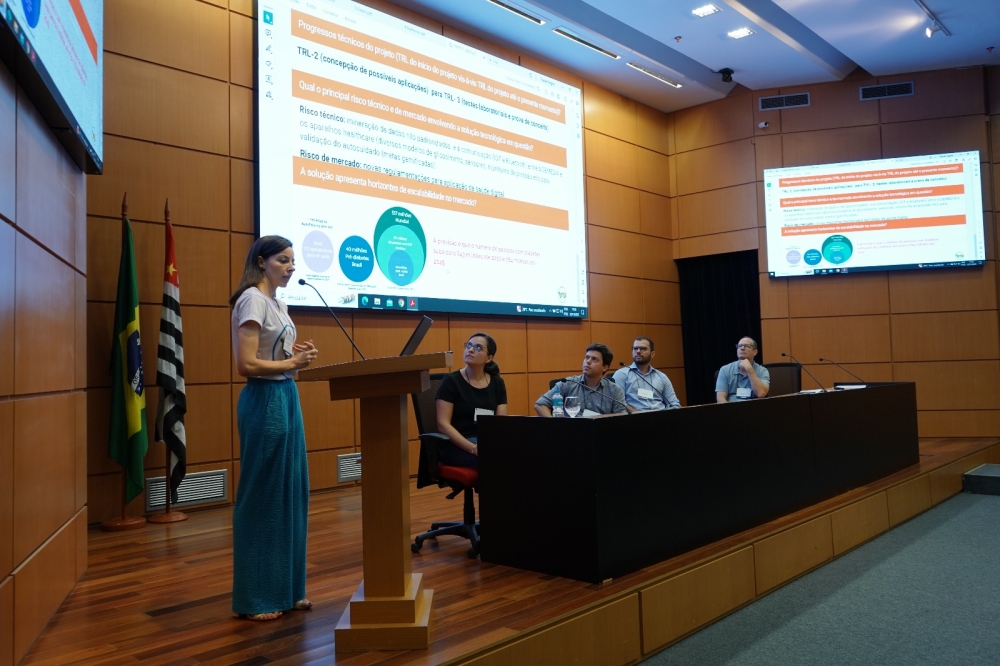


Photo: Daniel Antônio/Agência FAPESP
Published on 01/15/2024
By Julia Moióli | Agência FAPESP – Representatives of startups based in São Paulo state that reached the final stage of the local arm of Centelha (“spark”), a national program to support innovative entrepreneurs and disseminate entrepreneurial culture among young people, met at FAPESP on November 22, 2023, to pitch their innovation projects to managers of the state and federal programs that are investing in them.
Two rounds of pitching consisted of two-minute presentations of the results of their projects, most of which are in the final stages, in areas such as social technology, chemistry, artificial intelligence and biotechnology.
“Some projects were completed in November. Others will be finalized in February. The feedback they received today will help them make adjustments to assure success or better results,” said Patrícia Tedeschi, FAPESP’s manager for innovative R&D.
One of the most highly praised projects was Demedia, a digital platform based on information and communications technology (ICT) assisted by artificial intelligence (AI) to help users control and prevent chronic complications of diabetes.
The technology is being validated at the Armed Forces Hospital in Brasilia (HFAB) and in Indigenous communities in the states of Ceará and Maranhão. Patients use a smartphone app that resembles a computer game, with goals set by a predictive model on the basis of patient data (read more at: agencia.fapesp.br/44864).
Goals met earn rewards in the shape of digital “coins” that can be converted into a discount on goods or services relating to control of diabetes, such as low-sugar foods, devices for measuring blood sugar and pressure, fitness classes and physical activities.
“Our focus is on reducing the risk of complications associated with diabetes, such as blindness, amputation and chronic kidney disease, and improving the quality of life for patients who have complications,” said control and automation engineer Marcia Ferrarese de Araújo, CEO of Demed Tecnologia em Saúde, which is developing the platform. “As a result, we can also have an economic impact on the health service by preventing procedures and hospitalizations.”
Besides the benefits for patients, anonymized data collected by the platform can be used to produce epidemiological profiles that support the work of healthcare professionals and policymakers.
“In terms of scalability of the idea, it’s worth noting that the number of diabetics in the world is rising despite the available treatments. Brazil is believed to have some 40 million pre-diabetics and counting,” Araújo said.
Another highlight was Melox, a 3D-printed biochip for subcutaneous administration of a single slow-release dose of an anti-inflammatory drug in pets (dogs and cats). The device is being developed by 3D Pharma, a startup incubated at an innovation hub run by the City of Araraquara. It produces solutions for activities ranging from pharmaceuticals and cosmetics to nutrition, dentistry and veterinary medicine.
“Our biochip helps medicate small animals with therapeutic efficacy and low stress,” said Juliana Cordeiro Cardoso, a partner in the firm with a PhD in pharmaceutical sciences.
Another advantage is that it is made of biodegradable material and is totally absorbable by the animal’s organism without any danger to health, according to the firm’s representatives.
Fostering technological entrepreneurship
The Centelha program is an initiative of the Ministry for Science, Technology and Innovation (MCTI) and FINEP, the Brazilian Innovation Agency, in partnership with the National Council for Scientific and Technological Development (CNPq), the National Council of State Research Support Foundations (CONFAP), and CERTI Foundation. FINEP and CNPq are arms of MCTI. FAPESP executes the program in São Paulo, with the aim of fostering innovative entrepreneurship and disseminating this culture among young scientists and researchers.
Before the pitching event, the participants in Centelha had over a year to transform their ideas into successful companies. The process comprised three sets of workshops, mentorships and training sessions provided by experts from FAPESP, the São Paulo branch of SEBRAE (the Brazilian small business support service), and ABStartups (the Brazilian Startup Association), with feedback and funding to provide a safety net that is expected to reach BRL 5 million in five years.
“The support provided via training and mentoring covered not just entrepreneurship but also how to conduct research projects and raise funds, as well as how to develop a business plan,” Tedeschi said.
The event was opened by Carlos Américo Pacheco, CEO of FAPESP, who spoke about the various instruments in FAPESP’s innovation agenda and lauded Centelha as one of the most important programs on the map for fostering innovation by small firms.
Next, before the pitching began, Tomás Bruginski de Paula, FAPESP’s manager of institutional relations, spoke about planning of fundraising and investment in startups, a key aspect of endeavors to assure their sustainability over the long term.
He outlined the history of FAPESP’s support for innovation, including its accelerator program and internationalization initiatives, as well as more recent moves to acquire minority stakes in startups via venture capital funds and the development of 27 Engineering Research Centers (ERCs) in partnership with private enterprise.
Noting that Brazil’s legislation has become more aligned with international reality and favorable to new possibilities, such as more flexible hiring and investment by universities and government, he highlighted the advantages enjoyed by small firms in São Paulo state’s ecosystem compared with other regions of Brazil. “This state has the best possible funding support and is the only Latin American hub to figure in the latest innovation and competitiveness ranking,” he said.
Marcelo Camargo, FINEP’s head of applied research and technological development, spoke about the three pillars of success for innovative startups. “These firms are born with an innovation culture. They have a clear vision of the need for an innovation plan, which is sometimes more important than the business plan. A capital structure is absolutely essential to implement these innovative ideas. It’s also necessary to keep a close watch on global value chains,” he said.
Source: https://agencia.fapesp.br/50633